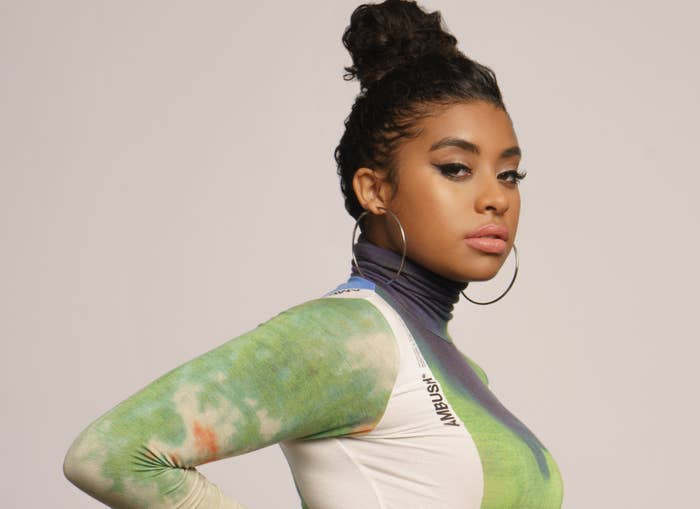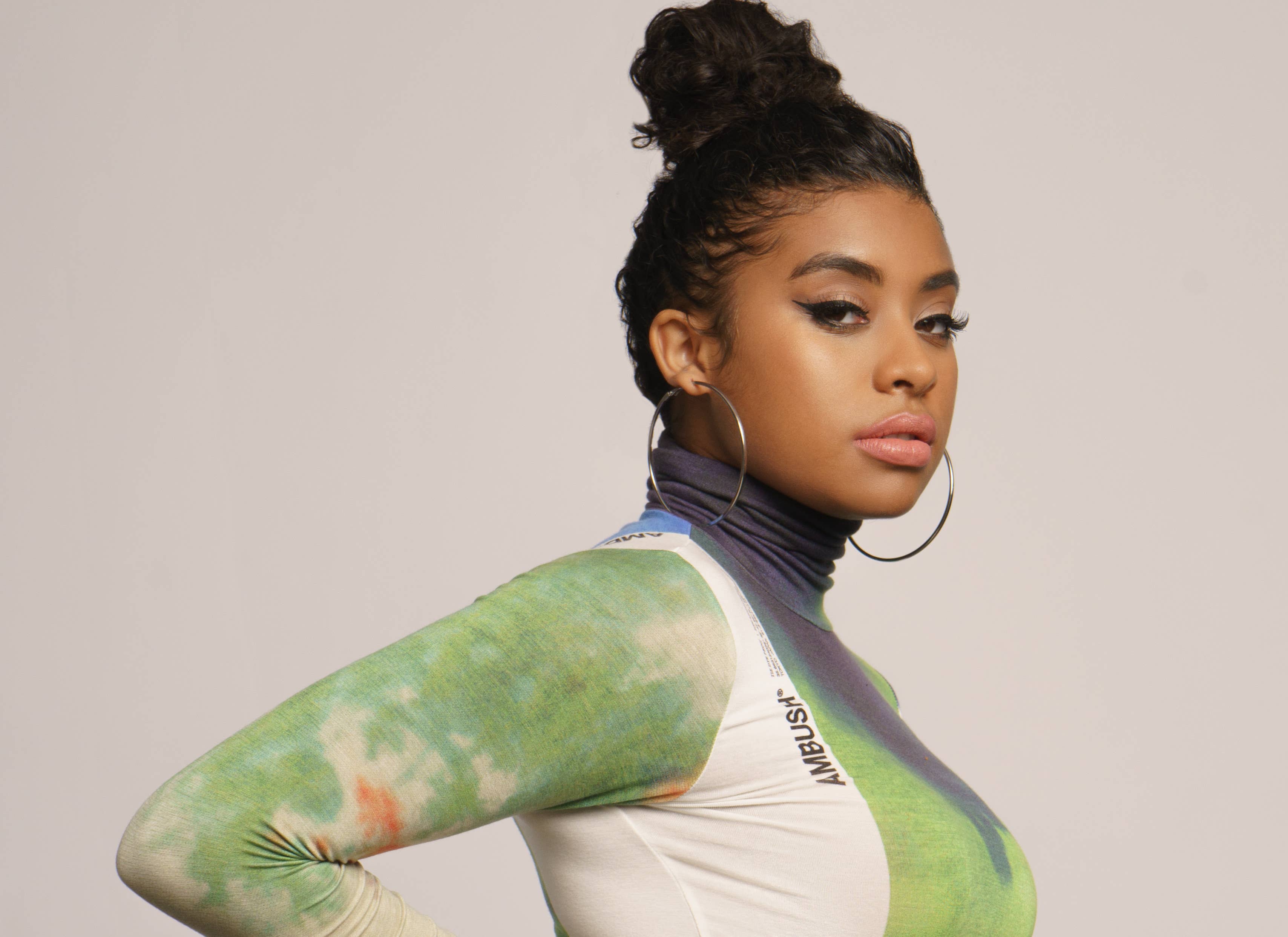
Bronx native Alycia Pascual-Peña portrays a student named Lucy Hernandez, a bold, outspoken Latina, in Netflix’s latest coming of age movie, Moxie. Lucy, starting at a new school, inspires Vivian (Hadley Robinson) to stand her ground against their loudmouth and rude classmates. Moxie premiered on Netflix on March 3, and the actress spoke to Complex about her experience with landing the role, working with Amy Poehler, and bringing her Afro-Latinidad into her character.
Poehler (who also plays Vivian’s mom, Lisa) directed the film and based it on Jennifer Mathieu’s novel of the same name. The film centers around Vivian, who publishes an anonymous magazine called Moxie after an encounter with her new friend, Lucy, makes her want to expose the sexism, bias, and wrongdoings in their high school and unexpectedly sparks a massive feminist movement.
The concept of activism isn’t new to Pascual-Peña, and she says activism is one of “the largest pillars” in her life. One look at her Instagram, and it’s easy to see that she supports all sorts of causes—from female empowerment to Black Lives Matter to transgender rights—so this character was a fit from the start. “I’ve been privileged to play a character that I was able to be my complete self. Lucy is this outspoken rebel who’s committed to others and committed to activism. Lucy is never scared to speak her mind, and to use her voice, and to remain true to who she is, and I think that those are traits that I have in my own life,” she said. “I’ve always been, as my mother would put it, a rebel with a cause, but I felt for most of my life, literally up until recently, that had a negative connotation. That was demonized, and people would tell me to be less radical,” the actress added. “To have a film that says ‘No, use your voice, be outspoken, make people uncomfortable,’ and celebrates that, and gives the term ‘feminist’ and ‘activist’ a positive connotation, is powerful.”
The actress, who also stars in the Saved By the Bell reboot on Peacock, took a semester off from Marist College for work and was in LA with her mom when she auditioned for the role. “I was reading through the script, and she immediately was like, ‘Wait, this is you, have they met you?’ They called me the next day, and I met with Amy for my director session. About a week and a half later, I found out that I booked the job,” Pascual-Peña said. Moxie is Pascual-Peña’s first feature role, and she still doesn’t believe that she got to work alongside Poehler, who has also played strong feminist characters like the relentless Leslie Knope in Parks and Recreation. “If I could tell little Alycia that she was going to be working with Amy, she probably would have laughed in my face. Working with Amy has been more than I could ever dream. I’ve always looked up to her. I grew up watching her on SNL with Maya [Rudolph] and Tina [Fey]. So when I saw that she was directing this, I was dumbfounded and super excited, but then I got on set, and I was like, ‘This is special,’” she shared. “She did it all on this film, and that is the dream. She is the epitome of being a leader and putting her money where her mouth is. She created a space that supported women, and she cultivated this family. There was this beautiful duality of someone who was a leader and fearless, but also made us comfortable and was kind. She’s an icon and super, super talented, but more importantly, she’s an amazing human being.”
The film gives a pretty accurate portrayal of what life is like in many parts of the country by having a diverse and inclusive cast, but that’s not the case for most film and TV projects. Last week, the findings of a Netflix diversity audit that the USC Annenberg Inclusion Initiative conducted were published, revealing a large disparity in racial representation on film and TV crews. Researchers examined 126 Netflix original movies and 180 original scripted series. They found that of the content shared on the platform between January 2018 through December 2019, just 4.5% of main cast members were Latinx, while Latinx people make up around 18% of the United States’ population. Part of the problem is the lack of Latin American executives and people in leadership positions at major Hollywood studios. While casting stars like Pascual-Peña is a huge step forward, people in leadership positions, like Poehler, in this case, really are the ones who currently hold power to effect real change. Casting the 21-year-old as Lucy was a necessary move in the right direction for diversifying Hollywood.
“For a long time, we had to deal with the erasure of our community completely. Frankly, in my life, I’ve encountered so many people that did not know that Afro-Latinos exist. The media takes part in that. There just needs to be more representation as a whole, and that goes for all marginalized and disenfranchised communities, but specifically for Afro-Latinos,” she said. “I’m grateful to now be in this journey where I’m getting to tell stories and be on screen and hopefully educate and empower people. But there’s not enough. I’m still one of very few and blessed to be inspired by people within the media who are Afro-Latinos proudly. There just needs to be more of us and more stories centered around us, more people behind the camera and writing the stories where Afro-Latinos are a part of minority communities. I’m excited to see the industry continue to progress the narratives when it comes to telling stories of people within the BIPOC community and the LGBTQIA+ community.”
Luckily, her first experience on a movie set was incredibly diverse. “I got to walk onto set each day and look next to me and know that the majority of our cast was women, but not only women but Black women, Latino women, Asian women. Intersectionality was at the forefront of this film. We tried to practice what we preach with what our cast looks like,” she said. “It was so special not to feel like there was disingenuous diversity or that there was tokenism going on on set because Amy cared about women being respected and celebrated in their fullness. And then understanding that femininity and womanhood are subjective and it looks different for each person, and that’s powerful and beautiful.”
Pascual-Peña said the Baby Mama actress gave her free reign and encouraged her to be authentic and add parts of her culture into the film. In one scene from Moxie (that gave me goosebumps as I watched), Lucy shows Vivian how to dance Bachata—a Latin music genre that originated in the Dominican Republic. “That was all improv and my first day on set, ironically. But it means the world. I never saw moments like that on-screen ever. I literally cannot think of one instance where I saw an Afro-Latina proudly celebrating who she was on screen. I’m grateful that Amy created a space and said, ‘Be yourself. Bring your culture and bring Alycia to Lucy.’ And I did that,” she said. “Being able to proudly celebrate my intersectionality is super important. It’s one of my favorite parts of this film. I hope that people within the Latinx community feel empowered by those moments and can take joy in them. That specific scene in the movie, when I watched it with my mom, she got teary-eyed because she was like, ‘That’s who you’ve always been.’ It’s unfortunate that the media hasn’t always respected the complexity and beauty of the Latinx community. I’m excited for everybody to see those little moments where Amy just said, ‘Girl, go.’
“Every role I play, it’s important that it’s authentic and sincere. There’s so much power in specificity, and I can speak to certain nuances in our community because that’s home for me, that’s my culture, that’s been my entire life, so I’m grateful for those moments,” the Saved By the Bell star continued. “There are going to be people that won’t catch the Bachata moment or won’t catch the fact that I denounced machismo energy towards the end of the film. So that is an homage to my culture that I take so much pride in. I see the entire movie as a love note for women, but specifically Lucy, I wanted her to be a celebration and a multifaceted portrayal of Black and Latinx women.”
Much of Pascual-Peña’s vibrant personality was shaped by growing up in the Bronx with her Dominican family. The New York City borough has been responsible for producing some incredible talent like Cardi B, Jennifer Lopez, and Jharrel Jerome—and Pascual-Peña knows it’s no accident. “There’s a beautiful and powerful energy that is cultivated in the Bronx. Its people have to be resilient, persevere and are exposed to a lot of different perspectives and cultures. There’s something just so special and cosmic [about] the Bronx. It’s had a huge impact on who I am as a woman. It’s made me resilient, more culturally aware, and proud of who I am. In the Bronx, you’re forced to figure it out and overcome,” she said. “It’s no coincidence that we see such amazing talent come from the Boogie Down, and I think it’s just going to continue to happen. Some people may have a negative perception of the city because of its grit, but I think that’s one of the reasons that we are so special. We take that into our art, and it allows us to create impactful stories and impactful art.”
At just 21, she is already setting herself up to have a long-lasting acting career and hopes to inspire others to go after what they love despite any naysayers who try to get in their way. “For Latinos and Afro-Latinos and people of color in general, sometimes we’re deterred from pursuing the arts because it doesn’t seem reliable or realistic, and that’s a lie. We should have the opportunity, and we are more than capable of pursuing whatever we’d like, even if the world deemed that it’s not possible,” she said. “Pursue things even when you’re met with discontent and know that you’re on your distinct journey. Be proud of who you completely are, and never minimize yourself. And specifically to young Afro-Latino girls, never let anybody put you in a box or make you feel like you should only celebrate one aspect of your identity.”
Pascual-Peña is part of a generation that is collectively yearning for genuine change and is outspoken about important causes. Fittingly, the film focuses on how activism doesn’t have to look any specific way for it to be meaningful, especially when in unity with others. The actress says she hopes to continue creating change and making waves herself so that more Black and Latina women in the industry feel empowered to use their voice. Moxie is now available for streaming on Netflix.


